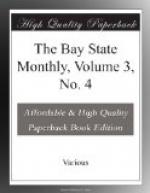It will be seen that the first appearance of the name of Ticknor, as in any way associated with the publishing of books, was in 1832. In the spring of 1864 Mr. William D. Ticknor visited Philadelphia in company with Nathaniel Hawthorne; was taken suddenly ill and died there. Shortly afterwards his eldest son Howard M. Ticknor, a graduate of Harvard College in the class of 1856, was taken into the firm, which, under the name of TICKNOR & FIELDS, held a very prominent place among American publishers for over twenty years. During the period ending with the year 1867 the Old Corner was one of the best known spots in Boston, not alone by reason of its antiquity, but equally by reason of its distinguished literary history and its habitues. Here Charles Dickens and Thackeray used to loiter and chat with their American publishers; Lowell, Longfellow, Holmes, and Whittier, and Whipple the essayist, made it their head-quarters. Nearly all of their best-known writings, and those of Emerson, Hawthorne, Saxe, Winthrop, Bayard Taylor, Mrs. Stowe, Aldrich, Howells, and a host of other well-known authors, sooner or later bore the imprint of the house of Ticknor. After the failure of Messrs. Phillips, Sampson,& Co., the “Atlantic Monthly,” first suggested by Mr. Francis H. Underwood, now United States Consul to Glasgow, passed into the hands of Ticknor & Fields, and, a little later, was added “Our Young Folks,” edited by J.T. Trowbridge and Lucy Larcom, “Every Saturday,” edited by T.B. Aldrich, and the “North American Review,” long edited by James Russell Lowell.
[Illustration: THE OLD CORNER IN 1850.]
Still later the firm name was Fields, Osgood, & Co., then James R. Osgood & Co., then Houghton, Osgood,& Co., and again James R. Osgood & Co. The last-named firm published a remarkable series of books, which their successors inherit.
[Illustration: 124 TREMONT STREET.]
At no time in its history, from 1832 to the present time, has the firm been without a Ticknor in its copartnership. For a brief season, however, the name disappeared from the firm’s imprint.
The great publishing house has just inaugurated a new tenure of life as Ticknor & Co., the copartnership consisting of Benjamin H. and Thomas B. Ticknor, sons of William D. Ticknor, and George F. Godfrey, of Bangor, Me., a gentleman of marked culture and geniality, and one, too, who, all may rest assured, will take kindly to and will find success in the book business. With scholarly acquirements, and with minds trained to the wants of to-day, the sons of W.D. Ticknor, both gentlemen of refined literary taste, now step to the front with strong hands and vigorous purposes, not alone to perpetuate but to add to the former reputation of the time-honored publishing house.
The new house succeeds to a rich inheritance of the books of younger American authors,—those of Howells, James, Edgar Fawcett, Kate Field, Mrs. Burnett, Miss Howard, Julian Hawthorne, George W. Cable, and others. That it means to maintain the supremacy is foreshadowed by the list of important works which it has announced as forthcoming.




